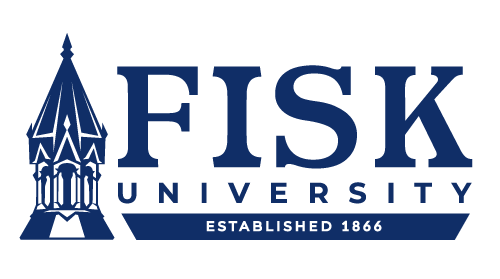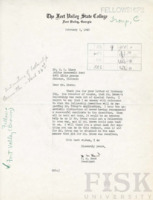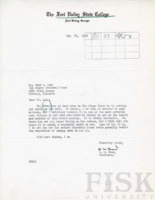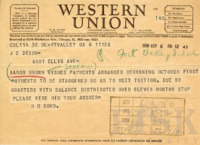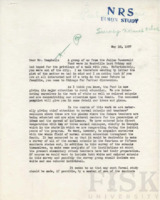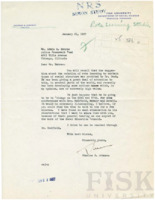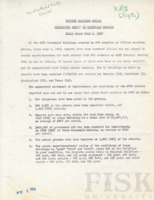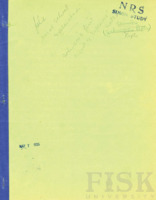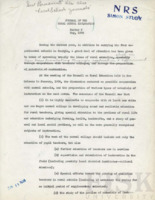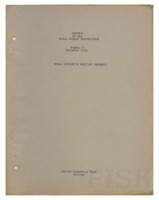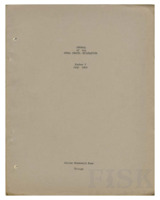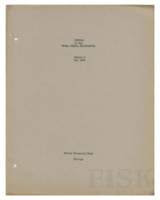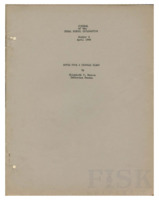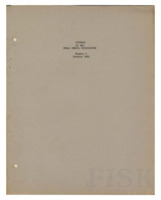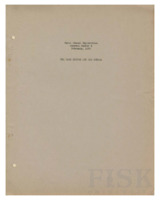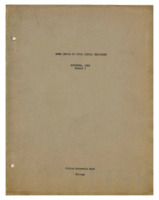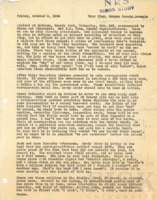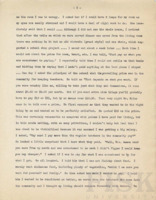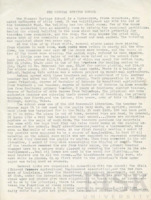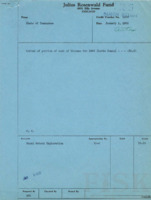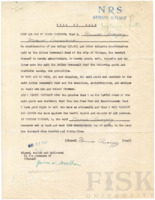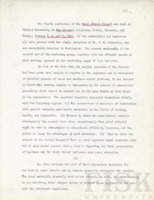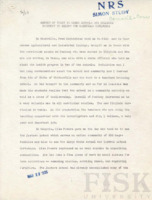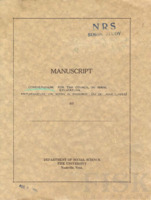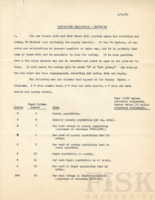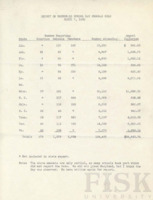Browse Items
SORT
Cornelius Vanderbilt Troup Fellowship Correspondence and Grant Records, 1940 - 1941
This collection includes letter correspondence, checks, and payment records concerning Cornelius Vanderbilt Troup's fellowship. Key individuals include Dr. Horace Mann Bond, Mr. J.C. Dixon, Dorothy Elvidge, and Edwin R. Embree. The materials document the approval and disbursement of a $2,000 grant, with an additional $300 awarded, enabling Mr. Troup to study under Dr. Nelson L. Bossing at the University of Minnesota.
The collection also contains Mr. Troup's fellowship application documents, a detailed plan of work, and recommendation letters from W.A. Robinson, Miss Hattie V. Feger, and Dr. Horace Mann Bond.
Lawrence A. Jones Fellowship Correspondence and Financial Records, 1941–1942
This collection comprises correspondence, checks, and payment records related to Lawrence A. Jones, a faculty member at Fort Valley State College in Georgia. Key individuals include Dr. H.M. Bond, Fred G. Wale, Dorothy Elvidge, William C. Haygood, and Robert C. Smith. The documents detail the approval and disbursement of an $800 expenditure for Mr. Jones to pursue studies in Mexico from July 1941 to January 1942.
Aaron J. Brown Fellowship and Dissertation Correspondence, 1939–1942
This collection features correspondence, checks, and payment records related to Aaron J. Brown, a faculty member at Fort Valley State College in Georgia, during his fellowship to study at the University of Chicago from 1939 to 1940. Key figures in the correspondence include Dr. Horace M. Bond, Dr. J.C. Dixon, Miss Dorothy A. Elvidge, and Mr. Fred G. Wale. The materials document checks received by Mr. Brown throughout his fellowship.
Additionally, the collection includes letters involving these individuals and John Dale Russell, a professor of education at the University of Chicago, concerning a $200 grant awarded in 1942. This grant supported Mr. Brown’s travel plans to visit high schools for research related to his doctoral dissertation proposal, conducted under R.W. Tyler.
Correspondence on a Southern Study of Rural Teacher Training
This collection contains letters and meeting notes about a planned study on how rural and elementary teachers are trained in the South. The project was organized by the Julius Rosenwald Fund, with Dr. Doak Campbell from George Peabody College set to lead it. The idea was to take a close look at normal schools, figure out what makes a good rural school and teacher, and then use that to shape better teacher preparation. The letters go over funding, possible team members, and the suggestion to focus on a few key states or regions. There’s also an emphasis on working with both Black and white educators and grounding the project in Southern institutions.
Rote Learning in Southern Rural Schools
This collection contains documents and correspondence centered on a study of rote learning in rural Black schools, led by Charles S. Johnson and Robert E. Park at Fisk University. It includes letters and a long memo from Park, where he reflects on how students often memorize without really understanding, especially when lessons don’t connect to their lives. He talks about how this pattern is tied to history, lack of books, and a gap between school and community. Park suggests trying something different: a school that works with the whole community, focuses on real issues like public health, uses local news and film to spark interest, and makes learning more about thinking than repeating.
In-Depth Report on Rural School and Community Work in Fitzhugh, Arkansas
This collection contains report by John Gammon Jr. on the Fitzhugh Community in Arkansas, where he worked as a vocational agriculture teacher. It describes the makeup of the community, the condition of homes, and how six small schools were combined into one. Gammon outlines his five-year plan to improve things like sanitation, home gardens, poultry, and school attendance. He talks about the progress made through evening classes, canning clubs, and a poultry association that served both Black and white families. He also discusses the resistance he faced from local preachers, the limits put on students by their families and landlords, and the need for more teachers and better coordination within the school.
Digest of the First Diaries of the Explorers
This collection contains a journal summarizing the first field reports from rural school explorers, who recorded daily life in Southern Black communities. It captures local customs, superstitions, family roles, school attitudes, and community tensions. The entries come from places like Fair Play and Red Oak in Georgia, Pine Bluff in Arkansas, and Washington Parish in Louisiana. Observations cover how people talk, what they value, what divides or unites them, and how schools fit into their lives. There are also notes on teacher quality, church influence, and hopes or confusion about help from the Rosenwald Fund.
Journal of the Rural School Exploration Number 9
This collection contains Volume 9 of Journal of the Rural School Exploration. The journal documents efforts to expand rural education through collaboration with teacher colleges and the development of instructional materials. It reports on discussions at the Council on Rural Education in New Orleans, recommending cooperation with both white and Black normal schools, beginning with South Georgia Teachers College. They had plans of adding departments in agriculture, industrial arts, rural sociology, health, and reading, and using demonstration schools for field training. There were plans and efforts to develop appropriate reading materials for rural children, including new books written by authors like Winifred Wise and Arna Bontemps.
Journal of the Rural School Exploration Number 8
This collection contains Volume 8 of Journal of the Rural School Exploration. The journal provides an in-depth study of rural schools in British Columbia, covering the region’s geography, history, and school system. It describes the development of public education from the days of the Hudson Bay Company to a government-supported system.The journal details the province’s health initiatives in schools, including annual medical exams, trained public health nurses, and a unified health service. There was also an experimental centralization program in the Peace River District, led by Inspector W. Plenderleith, which united multiple schools under one official trustee. The report was now concluded with recommendations to extend this centralized model across the entire province.
Journal of the Rural School Exploration Number 7
This collection contains Volume 7 of Journal of the Rural School Exploration. The journal includes a historical account of the Penn School on St. Helena Island, South Carolina, tracing its origins to federal efforts in 1862 to rehabilitate freed slaves through supervised agriculture and education. It details the early challenges of transitioning from slavery to wage labor, the establishment of schools by northern missionaries, and the evolution of Penn School from repetitive academic instruction to practical training in farming, carpentry, and home economics.
Journal of the Rural School Exploration Number 5-6
This collection contains Volumes 5 & 6 of Journal of the Rural School Exploration. The journals include reports from the third Council on Rural Education meeting in Nashville, Tennessee, the training of rural teachers through summer schools for African American educators, and firsthand field accounts from explorers working in communities such as Fitzhugh (Arkansas), Red Oak and Fair Play (Georgia), and Mineral Springs (Louisiana). There is also a report on curriculum development in Southern states and experiments in reading education. Number 6 features a detailed study of rural schools in New Mexico and their efforts to integrate Spanish cultural heritage into school life.
Journal of the Rural School Exploration Number 4
This collection contains Volume 4 of Journal of the Rural School Exploration. This includes notes from a Georgia diary written by Elizabeth P. Cannon and cathering Duncan
Journal of the Rural School Exploration Number 2, 1935
This collection contains Volume 2 of Journal of the Rural School Exploration. This mentions where the members of the rural school exploration have been stationed in the South.
Journal of the Rural School Exploration Number 3
This collection contains Volume 3 of Journal of the Rural School Exploration. This includes a document talking about how the farm system in the rural south.
Newsletter to the Rural School Explorers Numer 1
This collection contains Volume 1 of a journal - Newsletter to Rural School Explorers. This includes excerpts from letters by Buford H. Junker, Harvey Purifoy, Estelle Massey Riddle, and many more.
Several Volumes of Newsletters to Rural School Explorers
This collection contains report by John Wilson on the school at Morgan County, GA. Written in 1934. The report contains reports on the day to day activities of the author, information about the school, various churches, finances for school projects, and adult classes. There was also information about various individuals in the community. Written as a part of the Simon Study.
Report on the Mineral Springs Community
This collection contains description of the Mineral Springs School and a report written by Estelle Massey-Riddle, written in Ouachita Parish, Louisiana in 1934. It includes a description of the community, various observations about the community (the public health in the community among other things), in-depth information on various individuals in the community, and some travel information of the writer. Written as a part of the Simon Study.
Rural School Exploration Report of Estelle Massey-Riddle at Mineral Springs School, Ouachita Parish
This collection contains description of the Mineral Springs School and a report written by Estelle Massey-Riddle, written in Ouachita Parish, Louisiana in 1934. It includes information such as the description of the school, information on various classes, teachers, and some finances of the school . It also included a description of the community, various observations about the community (the public health in the community among other things), in-depth information on various individuals in the community, and some travel information of the writer. Written as a part of the Simon Study.
Julius Rosenwald Fund: Financial and Correspondence Records, 1935–1937
This collection features correspondence, payment vouchers, insurance records, and financial documents related to the Julius Rosenwald Fund from 1935 to 1936. Key figures in the correspondence include Edwin R. Embree, Margaret S. Simon, D.A. Elvidge, and Lewis Jones. The materials document expenses associated with rural school exploration, vehicle insurance, car repairs, and reimbursements connected to educational activities in the Southern United States.
Report on Automobile Purchases and Insurance for Rosenwald Explorers, 1934-1935
This collection features bills of sale, insurance documents, payment vouchers, and telegrams related to the purchase and management of automobiles for Rosenwald Fund field workers, from September, 1934, to December, 1935. Key figures mentioned include Horace Mann Bond, John E. Wilson, Estelle Massey Riddle, Buford H. Junker, Margaret Simon, and various car dealers and insurance agents. The documents detail the purchase of several used cars, mainly Ford and Chevrolet models, across Louisiana, Georgia, and Arkansas, along with the registration, insurance coverage for public liability and property damage, and maintenance arrangements. The Fund's agents coordinated the acquisition and resale plans for the cars through telegrams and bank drafts, for support to their field staff’s transportation needs in rural education studies. Insurance was managed through companies like Aetna and Fidelity and Casualty Insurance Company of New York.
Council on Rural Education Fourth Conference Proceedings, 1934-1937
This collection features proceedings, reports, and correspondence related to the fourth Council on Rural Education conference, held at Dillard University in New Orleans, Louisiana, from January 3 to 5, 1936. Key figures in the materials include Dr. Judd, Dr. Patterson, Mrs. Simon, and members of the Julius Rosenwald Fund. The documents detail discussions on rural education reform, focusing on teacher training, instructional materials, and the role of normal schools in improving educational outcomes. Additionally, the collection highlights collaborative efforts between the Council and other educational institutions to enhance rural schooling across the Southern United States.
Report of Visit to Negro Schools and Colleges Incident to Seeing the Rosenwald Explorers, 1935 - 1937
This collection features reports and letters by John J. Coss, Margaret S. Simon and others about visits to Negro schools and colleges in the South between February, 1935, and January, 1937. The documents describe how Rosenwald Explorers visited schools in Georgia, Louisiana, Arkansas, and Tennessee to study rural Black education. Topics discussed include poor school buildings, low teacher salaries, the need for better curriculum materials, and connecting school programs to farming, health, and home skills. Key figures are John J. Coss, Margaret S. Simon, Edwin R. Embree, Fred McCuistion, Miss Powers, and E.E. Stallworth. The reports suggest moving from general exploration to focused curriculum development and recommend partnering with normal schools and book publishers to support rural education. The collection stresses the need for stronger teacher training and closer cooperation between Black and white educators.
Compendium for the Council on Rural Education: Memorandum on Work in Progress, 1936
This collection features a memorandum, statistical data, and reports from the Department of Social Science at Fisk University, dated June 5, 1936, detailing work in progress for the Council on Rural Education. The materials include analyses of rural education conditions, educational expenditures, population demographics, and social organization across Southern states. Key figures in the collection include members of the Council on Rural Education and contributors to related research efforts. The collection highlights ongoing studies and initiatives aimed at improving rural schooling and addressing educational disparities.
Rural School Exploration Simon Study, 1934 - 1937
This collection features statistics, memoranda, letters, and payment records related to James F. Simon's "The Simon Study", a social experiment to explore the cultural factors affecting black education in the rural South, from 1934-1937. Key figures in the correspondence include Dr. Charles S. Johnson, Mr. Buford Junker, Mr. Lewis Jones. The materials document all memoranda regarding the development of the Southern Georgia Teachers College in Statesboro, Georgia towards the "Compendium of Rural Schools in the South" in 1934. In addition, the collection includes all checks received by Dr. Johnson, the director of Fisk University, towards work on the "Compendium on Rural Life and Education".
Reports and Financial Summaries of the Rosenwald School Day Programs and Fund Allocations (1929-1938)
This collection consists of a series of letters, reports, and financial statements from various state education departments and officials to Mr. S. L. Smith, Director for the Southern Office of the Julius Rosenwald Fund. It details the use of funds allocated for the Rosenwald School Day programs. The funds were used for printing bulletins, postage, prizes for school improvement and beautification contests, travel expenses, and other incidental expenses. The reports include detailed expenditures, acknowledgments of funds received, and the impact of the programs on school improvements. The document also highlights the involvement of community organizations, the distribution of prizes and libraries to schools, and includes requests for additional funds, refunds of unused funds, and detailed accounts of how the funds were spent, including the names of winning schools and the prizes awarded.
